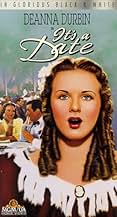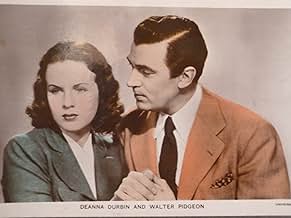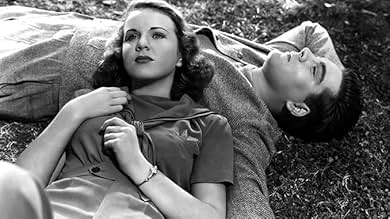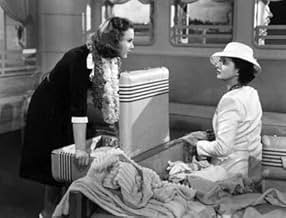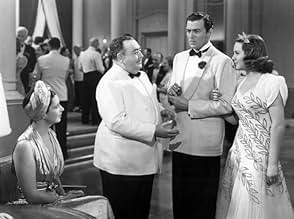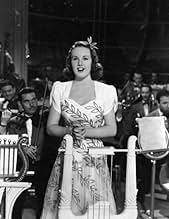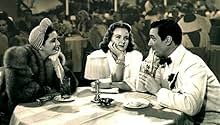अपनी भाषा में प्लॉट जोड़ेंAn aspiring actress is offered the lead in a major new play, but discovers that her mother, a more seasoned performer, expects the same part. The situation is further complicated when they b... सभी पढ़ेंAn aspiring actress is offered the lead in a major new play, but discovers that her mother, a more seasoned performer, expects the same part. The situation is further complicated when they both become involved with the same man.An aspiring actress is offered the lead in a major new play, but discovers that her mother, a more seasoned performer, expects the same part. The situation is further complicated when they both become involved with the same man.
- पुरस्कार
- कुल 4 जीत
- Ship's Steward
- (बिना क्रेडिट के)
फ़ीचर्ड समीक्षाएं
In Durbin's earlier films, I found her speaking voice high-pitched and a little annoying and her acting overly energetic to the point of being hyper. Here, she's delightful, bubbly without being manic, and she looks very pretty. Her singing voice has matured as well - she sings "Musetta's Waltz," "Ave Maria" and "Loch Lomond." The whole voice is richer though I will never be a fan of the way sopranos in those days were trained to back off of their high notes. She puts a little too much weight in the middle voice and therefore has a somewhat screechy Bb at the end of "Quando M'en Vo." Still, however, she is one of the best classical singers in film.
Though Durbin was a huge star at Universal, the studio never bought big properties for her. This is a nice film with good performances but that's about it. Kay Francis is lovely as Georgia and Loftus is funny as Sarah. The handsome Pidgeon does his usual good job.
Deanna Durbin in the end out-Garboed Greta Garbo, retiring at the age of 27 and moving to the outskirts of France, and I don't believe she's been seen since or even interviewed. The image and voice of the young girl live, and thanks to TCM, she undoubtedly has new fans. She deserves them.
Deanna is fledgling actress Pamela Drake, daughter of major Broadway star Georgia (Kay Francis). She works in a small regional theater but unexpectedly gets the chance to star on Broadway herself. Seeking seclusion in order to prepare for her big break, she heads home to Hawaii to spend some time with her mother. On the ship, she meets pineapple tycoon John Arlen (Walter Pidgeon), who first woos her but then also becomes interested in mama. It turns out that Georgia also expects to get the part already offered to Pamela and also wants John. Who gets the part? More importantly for these types of films, who gets the man?
Durbin is amazing, as always, and really gets the chance to show what a child prodigy she was (though clearly becoming a young woman here). She sings several standards such as "Loch Lomond" and "Ave Maria" with her fine soprano voice, and shows maturity far, far beyond her years. If you aren't familiar with Durbin, be prepared to be dazzled by her talent. There's one fine bit where Deanna, trying to convince the big-time producers (including S.Z. Sakall doing his usual hammy bit) to hire her for their show, does several wildly different characterizations in rapid-fire succession which are all excellent. Great acting talent, great singing voice, prettier in a classic sense than Judy Garland, Deanna was the complete package.
Pidgeon is great also, but he is up against formidable competition in the acting department here. He exudes his usual avuncular charm, and actually has some dashing moments on the ship to Hawaii as he tries to woo Pamela. Later, though, he appears bewildered at times, despite supposedly being the one in charge. Kay Francis is the clear loser. She is completely outclassed by Durbin, and is clad in weird fashions such as turbans that make her look dowdy and out of place, especially in a Hawaiian setting. It is difficult to believe that Arlen would choose her over Pamela. Plus, she is given almost no chance to do anything but sit and wait for John and Pamela to decide things for her, so her character and motivations are murky.
Durbin gets to sing several times with her beautiful operatic voice, and she gets to emote repeatedly both as her own character and as the character she is playing within the story. Plus, she has several supremely Diva moments ("I am through with men!"), culminating in the glorious opportunity to stalk off in a huff, the battle won but the war lost. The reality, though, is that she is still just a kid playing in a grown-up world, a fight the real Deanna would be waging until she finally gave it all up and left films altogether later in that decade, hopefully for a happier life without the strain of constantly meeting her own and others' extraordinary expectations for herself.
Ignore the story, but don't ignore Deanna, a true star.
The plot involves aspiring actress Deanna being offered a part that was originally promised to her stage diva mom (Kay). Then, in Hawaii, the plot shifts to a romantic triangle as the two women grapple, not for a part, but for the attentions of a pineapple tycoon, Pidgeon, who's more interested in the mother. The inherent drama in such a situation is jettisoned in favor of standard Universal Pictures sitcom antics. Kay Francis overacts but is never given any good lines, forced too often to simply react to the bubbly, aggressive Deanna.
The first section of the film offers the flavorful ambiance of a theatrical milieu, both Broadway and regional theatre, but then, after Deanna's offered the part of St. Anne, the action shifts to a cruise ship, where Deanna meets Pidgeon, and finally to Hawaii where she reunites with Mom. Once Deanna boards the ship, she leaves behind her quirky boyfriend Freddy, an aspiring actor played by the funny Lewis Howard, who then disappears from the movie. Freddy has a great bit early on where he tries to impress a casting director by acting like a 'dope fiend' which is what he thought Deanna said when she told him to try out for the part of the Dauphin. He starts going into withdrawal tics, rubbing his nose and scratching his arms, a daring bit at a time when the Production Code strictly forbade drug references.
Norman Krasna's script (from a 'story' credited to three writers) offers plenty of bright dialogue and funny bits, but the shifts in setting make it play like three movies crammed into one. William Seiter's heavy-handed direction seems more intent on showing off the lavish (for Universal) sets and less on showing off the actors, giving a bloated feel to the whole enterprise. Deanna's earlier films were leaner, zippier and bursting at the seams with youthful energy. The soundtrack is short on original songs and big on choral standards: Deanna's big numbers are 'Loch Lomond' and 'Ave Maria.'
क्या आपको पता है
- ट्रिवियाS.Z. Sakall's American film debut.
- गूफ़When John Arlen enters Pamela's room with her dress, she is fixing her hair and a hand mirror is on the vanity table close to the table mirror. But on the next cut, the hand mirror has changed position and is now partially sticking over the edge of the table.
- भाव
Karl Ober: I can't work in New York anyway. Is this place far from here?
Pamela Drake: Oh, no, Mr. Ober, it's only Maine. You know where Maine is!
Karl Ober: No.
Pamela Drake: Oh, it's practically a few minutes from here! You could write fine there.
Sidney Simpson: 'A few minutes'!
Pamela Drake: [to Sidney, blithely] Yes!
[to Ober]
Pamela Drake: That's all, really.
Karl Ober: [wagging his finger] Then it isn't quiet enough. I have to go further away from New York.
Pamela Drake: Oh, good - it *is* far away! Takes a whole day to get there.
[to Sidney, brightly]
Pamela Drake: Really, I'm an awful liar, aren't I?
Sidney Simpson: Yes.
- कनेक्शनEdited into Gems of Song (1949)
- साउंडट्रैकLove is All
(1940)
Music by Pinky Tomlin
Lyrics by Harry Tobias
Piano: Cecilia Loftus (uncredited)
Sung by Deanna Durbin (uncredited)
टॉप पसंद
विवरण
बॉक्स ऑफ़िस
- बजट
- $8,67,000(अनुमानित)
- चलने की अवधि1 घंटा 43 मिनट
- रंग
- पक्ष अनुपात
- 1.37 : 1
इस पेज में योगदान दें



